Investing.com - The dollar was broadly higher against the other major currencies on Thursday, as investors were eyeing U.S. inflation reports due later Thursday and on Friday for indications of whether the recovery in the greenback is sustainable in the longer term.
The greenback has been supported in recent sessions by upbeat U.S. employment reports, which fueled expectations the Federal Reserve will stick to its plans for a third interest rate hike this year.
USD/JPY slipped 0.19% to 109.86, just off Wednesday’s two-month low of 109.56, while USD/CHF edged up 0.19% to 0.9657.
Both the yen and the Swissie lost some steam but remained supported as heightened tensions between the U.S. and North Korea have sparked a flight to safety.
North Korea\'s state media said on Thursday that Pyongyang will develop a plan by mid-August to launch intermediate-range missiles at the U.S. territory of Guam.
The comments came after U.S. President Donald Trump said earlier in the week that North Korea would be "met with fire and fury" if it continued its threats.
The euro was down only 0.14% against the Swiss franc after losing 1.02% on Wednesday, marking the largest one day change since the Swiss National Bank shocked markets when it scrapped its currency peg with the euro in January 2015.
Elsewhere, EUR/USD slid 0.33% at 1.1720, while GBP/USD edged down 0.18% to 1.2981.
The pound was unfazed by data earlier showing that U.K. manufacturing production was unchanged in June, though industrial output registered a larger than expected increase.
The Australian and New Zealand dollars were weaker, with AUD/USD down 0.11% at 0.7881 and with NZD/USD tumbling 1.30% to 0.7271.
In a widely expected move, the Reserve Bank of New Zealand left interest rates unchanged at 1.75% on Thursday, but added that it still expects inflation to rise gradually.
RBNZ Governor Graeme Wheeler said monetary policy would remain accommodative for a while and that the Kiwi had risen since the last monetary policy statement in May partly in response to a weaker U.S. dollar.
Wheeler added that a lower New Zealand dollar would help increase inflation and achieve more balanced growth.
Meanwhile, USD/CAD edged up 0.19% to trade at 1.2626, the highest since July 14.
The U.S. dollar index, which measures the greenback’s strength against a trade-weighted basket of six major currencies, was up 0.24% at 93.63, just off the previous session’s more than one-week high of 93.77.
